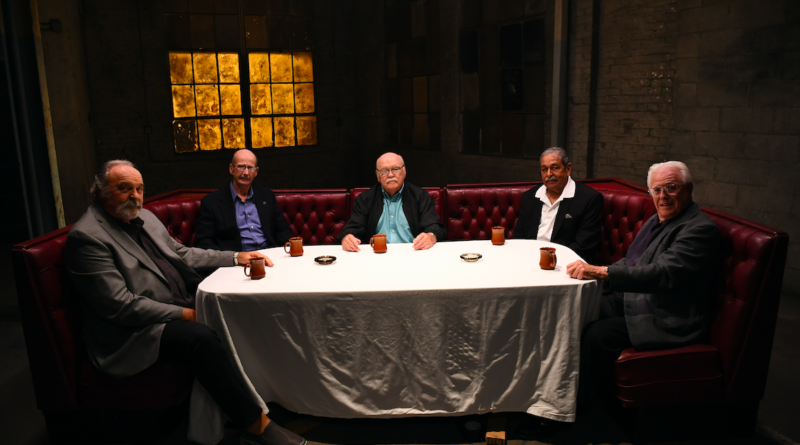INTERVIEW: New TV series chronicles serial killers in Los Angeles history
Photo: From left, Bob Souza, Tom Lange, Bob Grogan, Frank Garcia and Jerry LeFrois are featured in ABC News Studios’ City of Angeles | City of Death, now playing on Hulu. Photo courtesy of ABC / Matt Petit / Provided by press site with permission.
Hulu, in partnership with ABC News Studios, recently launched City of Angels | City of Death, a six-part documentary series that looks at the troubling case files of serial killers in Los Angeles history. In the 1970s and 1980s, many high-profile crimes filled the newspaper headlines in Los Angeles, and by the count of the city’s Robbery-Homicide Division, more than 20 serial killers over that timespan were on the loose.
The show follows a group of now-retired detectives who came together during this tumultuous time and attempted to stop the killings and apprehend the suspects. The series examines many of the police’s techniques, including stakeouts and handling of media releases. This was during a time before DNA analysis aided in the quest to catch serial killers.
For newbies to the true-crime subgenre, the 1970s and 1980s was when the Freeway Killer, Hillside Strangler, Skid Row Stabber and Sunset Strip Killer, among others, terrorized neighborhoods in Southern California. Two people who know the cases intimately are retired detectives Tom Lange and Bob Souza, both of whom are featured in the series. Lange was instrumental in the case against the so-called Skid Row Stabber, who is the subject of episode #2. Souza, featured in episode #4, is depicted in hot pursuit of the Freeway Killer, who captured and killed male teenagers, according to press notes.
Recently Hollywood Soapbox exchanged emails with Lange and Souza about their policing efforts and the new series. They jointly answered the questions, and their answers are slightly edited for style.
Why is it that when people think of serial killers they often think of the 1970s and 1980s? What was it about this time period that proved so deadly?
Serial killers were very prolific during the ’70s and ’80s, especially in Southern California where the climate certainly would have been a factor. There was also a large “victim pool” in greater Los Angeles, which would include a large transient population.
Hitchhiking was very common among young people, who were often the targets of these killers, and “street walkers” were another common target. There was easy access to a multitude of “dump sites” — a common term for where many killers would deposit their victims after killing them elsewhere. These sites were often checked out by the killers first and were utilized with the knowledge that the sites were in different jurisdictions than the killings. This of course would frustrate law enforcement’s efforts. Also, recall that there were no cell phones (and cameras) carried around by the vast majority of people, as is common today. DNA had yet to come onto the scene, therefore wouldn’t be a concern of the serial killer. Lack of self-awareness is always a factor, then and now.
How would you define the term “serial killer”? What separates a killer from a serial killer?
A serial killer is defined as a person who kills at least two victims who are not connected, at two different locations, with no apparent motive. There is normally no connection between the killer and the victim, as is common with many other cases of homicide. Motives may evolve as the killings continue.
How difficult was it to catch these violent criminals during a time period when DNA was not a tool?
Without the benefit of DNA technology, old fashion “shoe leather” and the ability to talk and relate to people was critical. Tenacity and the ability to “link” evidence was a must. You had to be willing to get your hands dirty.
Was figuring out the motive one of the keys to catching the killer?
While motive may be useful in “linking” cases, it is not essential in proving murder. In a serial case, like any other, it’s always about the evidence.
Are you opposed to giving serial killers nicknames? Does that make them celebrities in the newspapers?
Not opposed to nicknames, although they do sensationalize cases and sometimes may glamorize the killers to the extent they may be encouraged to continue. Serial killers are generally sociopathic, and encouragement would not be a good thing.
What do you think are the lessons of these crime stories for an audience in 2021?
Constant vigilance. Always be aware of your surroundings and what is going on in your community. Apathy is the enemy here.
By John Soltes / Publisher / John@HollywoodSoapbox.com
City of Angels | City of Death is now available on Hulu. Click here for more information.

